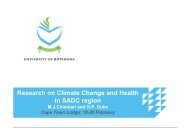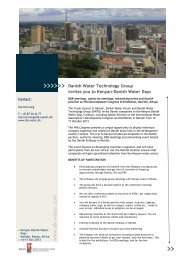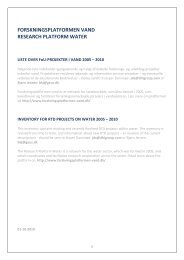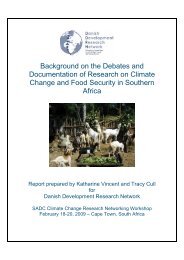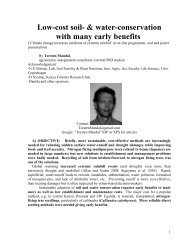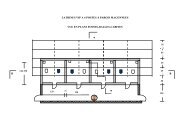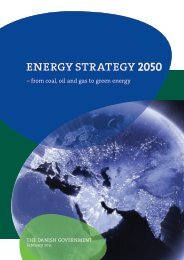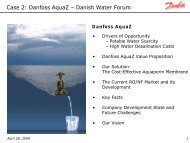Country: Vietnam: - Danish Water Forum
Country: Vietnam: - Danish Water Forum
Country: Vietnam: - Danish Water Forum
You also want an ePaper? Increase the reach of your titles
YUMPU automatically turns print PDFs into web optimized ePapers that Google loves.
1<strong>Vietnam</strong>ReferencesAndersen, Lars Skov. Introducing water rights in <strong>Vietnam</strong>. International working conference on water rights:institutional options for improving water allocation, Hanoi, <strong>Vietnam</strong>, February 12-15, 2003http://theme5.waterforfood.org/pubs/200302conf/papers/34<strong>Vietnam</strong>.pdfGlobal <strong>Water</strong> Partnership. <strong>Vietnam</strong>: law on water resources and related legislation for implementation of IWRM,Case Study. Undated.http://gwpforum.netmasters05.netmasters.nl/ZappEngine/objects/ACF4204.pdfADB, Comparative analysis of water sector reforms. Tracking progress in Asia and the Pacific.Phase 1 - Assessing water sector policies and reforms - country briefs. Viet Nam (searched on June 2006)http://www.adb.org/water/cfws/water-sector-reforms/tracking-progress-phase-one-VIE.aspTruong thi Quynh Trang. <strong>Water</strong> resources management in <strong>Vietnam</strong>. Workshop on water in Mainland SoutheastAsia, Siem Reap, Cambodia, Nov.30-Dec.2, 2005http://www.khmerstudies.org/events/<strong>Water</strong>/Quynh%20Trang%20Nov%202005.pdfFAOLEX. Legal office. Viet Nam <strong>Water</strong> Resources Law (No. 8/1998/QH10 of 1998)http://faolex.fao.org/docs/pdf/vie14294.pdf<strong>Country</strong> informationKey dates(policy, legislationand regulations)1998. Viet Nam <strong>Water</strong> Resources Law. It is a framework law, which came into force inJanuary 1999.<strong>Vietnam</strong> does not have a <strong>Water</strong> Policy as such, but there is a detailed National <strong>Water</strong>Resources Strategy which is based on the <strong>Water</strong> Resources Law, where the essence of theIWRM approach is considered.Performancedeficiencies(Why is reformnecessary?)Initiators,initiatives andobjectives<strong>Water</strong> allocationbefore reforms<strong>Water</strong> allocationafter reforms<strong>Vietnam</strong> has a draft document of a ‘Programme for Action implementing the Law on<strong>Water</strong> Resources and the National <strong>Water</strong> Security Vision’, although this programme hasnot been officially adopted.<strong>Water</strong> resources are being deteriorated and continue to be affected by for instance woodcutting and pollution. Economic growth, population growth and improved living standardsmake water demand rising and create water conflicts between sectors.Numerous government agencies held different authorities and responsibilities for differentaspects of water development, use and management. There were gaps and overlaps amongagencies and performance was weak.In the mid 1980s <strong>Vietnam</strong> embarked on a legal reform process aimed at bringing the useand protection of its water resources under the rule-of-law.<strong>Vietnam</strong> has long-standing traditions for free access to surface water and payment forsurface water via an agricultural tax that is based on the quality of land for cultivation ofirrigated rice.Overall legal frameworkThe Law on <strong>Water</strong> Resources is a framework law that states the policies and principles on
2the management and use of the water resources in <strong>Vietnam</strong>, but in order to becomeoperational it will require a comprehensive set of by-laws.Sustainable planning; priority to domestic water supply to all inhabitants; protection of thewater resource and quality and quantity monitoring are key issues. The legal frameworkcovers issues like participation and empowerment of stakeholders, management at riverbasin scale and decentralization of management of water resources. Revised documents on<strong>Water</strong> Resources includes obligations for the participation and empowerment ofstakeholders, management at the river basin scale, decentralization of water resourcesmanagement, efficient use of water, and separation of responsibilities for management anduse of water resources.<strong>Vietnam</strong> is in transition from water being perceived as a social good delivered by the state,towards water being considered as a social and economic good and its use being regulatedby an administrative systems of permits and licenses and by economic instruments in theform of fees on abstraction permits and charges on consumption.OrganisationThe responsibility for water resources management has passed from the Ministry ofAgriculture and Rural Development (MARD) to the Ministry of Natural Resources andEnvironment (MONRE). However, river basin planning and management is assigned toMARD including the responsibility to establish river basin planning organisations in theRed River and the Mekong River Delta.The National <strong>Water</strong> Resources Council (NWRC) was previously housed within MARD butoperated above the ministerial level. It helped MARD in coordinating the input from allrelevant ministries. This “apex” coordination/advisory body has now moved to MONRE.Issuing and revoking of permits with small abstraction (in groundwater: less than1,000 m3/day) is delegated to the provincial authorities (People’s Committees), while largeabstraction permits (in groundwater above 1,000 m3/day) will be administered at centrallevel.Policies on Integrated <strong>Water</strong> Resources Management and DevelopmentThe Law on <strong>Water</strong> Resources states the guiding policies and principles for the managementand development of water resources in <strong>Vietnam</strong>:• <strong>Water</strong> resources belong to the people and are managed by the State on their behalf;• <strong>Water</strong> should be managed within the systematic character of river basins, and should notbe fragmented across administrative boundaries;• Organizations and individuals are entitled to exploit and use water resource for life andproduction, but at the same time they have responsibility to protect the water resource, andto prevent, combat and overcome the harmful effects caused by water;• The use of water must contribute to social and economic development, ensuring the lifeof the population, the environment and national security;<strong>Water</strong> rights and regulations<strong>Water</strong> is owned by the people of <strong>Vietnam</strong> and is under the management of the State.The concept of water rights is clearly embedded in the Law on <strong>Water</strong> Resources through
5Technical capacity and monitoring<strong>Vietnam</strong> has its own institute that specifically conducts policy research on water resourcesmanagement (high technical capacity).<strong>Water</strong> servicesTo date, water services generally are provided by the state, with limited autonomy,accountability or responsiveness to customers. In public irrigation systems, according toADB, undated) poor or variable service delivery discourages beneficiaries from payingfees, so that a high level of subsidy (or system deterioration) is required.Performanceimpacts(social equity,economic growth,environmentallysustainability)Publicinvolvement<strong>Water</strong> tradeNo information availableNo information available<strong>Vietnam</strong>’s water law was drafted with participation of all government ministries with astake in water resources. The initial drafting process yielded, according to (GWP, undated)a preliminary law with an agricultural bias. Subsequently, wider representation wasachieved on the drafting team, and the resulting draft was more widely accepted. Theapproach was top-down and very much driven by research with narrow participation.According to (Andersen, 2005), the legal drafting of the groundwater use regulations wasinitially designed as a specialist exercise to be carried out by MARD experts and the teamof international and national consultants in a top down approach before testing in a fewdonor supported provinces. Information on the activity during regional workshops fordissemination of Law on <strong>Water</strong> Resources, however, brought expressions of interest from anumber of provinces leading to national consultation, which attracted 33 of the 61provinces in <strong>Vietnam</strong>. The workshop brought forward many examples and experiences indifferent aspects and methods of groundwater management applied at provincial levelirrespective of lack of national legislation and uncovered a broad demand for bettergroundwater management. At the workshop the legal framework was agreed upon and 6provinces representing different regions and hydro-geological conditions volunteered fortesting of the decision on registration and permits for groundwater abstraction. Thus, theprocess on groundwater use regulations has become increasingly participatory graduallyexpanding from the project to involve different ministries and provinces as well asinformation to the public, but not yet water users involving water user, mass organisationsor other NGOs.According to (ADB, undated), decisions with regard to projects generally are taken at ahigh level, with some internal discussion among government bodies, but there is increasingpublic debate about large water sector projects. Participation of civil society andgovernment-community partnerships are weakly developed, and most water-relatedactivities are carried out by government. Gender-related issues in regard to WRM largelyare neglected. Capacity building is well developed in regard to training and education for
6Challenges aheadhigher level officials, particularly in engineering.The use of groundwater is not widespread in <strong>Vietnam</strong> and most groundwater has a highsocial or economic value so it is likely that water resources or bulk water fees will beacceptable for its use, whereas <strong>Vietnam</strong> with its long tradition of free use of surface waterwill make it significantly more difficult to introduce the same legal framework for surfacewater.According to (GWP, undated) it is important to convince central authorities andgovernment officials of the need to adopt a decentralised and flexible managementapproach for substantial participation of riparian provinces (instead of primarily centralagencies).According to (Truong, 2005) challenges include: Lack of a comprehensive legal framework and sanctions results that for instance manyfarmers are drilling wells without applying for licenses. Management of water resources in river basin is weak since collaboration betweenprovinces involved is often limited. There is little research on impacts of dams and reservoirs Local staff may be afraid of changing procedures regarding public participation,unwilling to change, or they need time to learn about the new methods.



